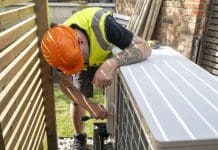Ben Griffiths, safety, health, environmental and ops director of Rye Group, argues that the demolition industry needs to do more to safeguard the environment beyond carbon offsetting
Global warming is now impossible to ignore. According to the World Meteorological Organisation, climate change has resulted in a fivefold increase in extreme weather phenomena. During this summer alone, we’ve seen deadly floods in Europe matched by a “heat dome” in Canada which – in the words of the World Weather Attribution Group – was made 150 times more likely to occur due to greenhouse gas emissions.
The UK, meanwhile, hasn’t escaped the accelerating effects of climate change, with 2020’s summer heatwave causing an estimated 246 deaths, as recorded by the London School of Economics.
There are two key lessons to be learned from these developments: firstly, companies have a moral obligation to do everything they can to operate sustainably and responsibly; secondly, clients and customers are now more likely than ever before to be influenced by environmental concerns when selecting a business or brand to purchase from.
Given its unavoidable associations with a certain amount of waste, the demolition industry needs to take this kind of lesson to heart and take the steps necessary to become sustainable.
That said, it’s worth exploring current emissions practices and asking the question: are we doing enough?
The insufficiency of offsetting
For many organisations, the problem of emissions has – as far as they are concerned – been dealt with. There are certain strategies through which they can claim to have achieved net zero carbon emissions without reducing the actual rate of those emissions.
The Climate Change Act now commits the UK to achieving net zero emissions by 2050.
This means that the UK – and a number of businesses – aim to achieve a balance between greenhouse gases produced and greenhouse gases removed from the atmosphere – and when the amount added is equal to the amount taken away, net zero has been reached.
In order to achieve net zero, many organisations use a process called carbon offsetting. This means they pay others to absorb or remove CO2 through methods like planting a certain number of trees to mitigate against carbon emissions.
While it’s never a bad idea to plant more trees, offsetting isn’t necessarily the best or most responsible way to take action against climate change.
For one thing, a new tree can take as long as 20 years “to capture the amount of CO2 that a carbon-offset scheme promises,” provided that such trees aren’t destroyed in the meantime.
More broadly, however, offsetting – alongside the quest for net zero – simply doesn’t require businesses to reduce their emissions at all, and this isn’t good enough: we can do better.
Taking decisive steps towards emissions reduction
Clearly, the way forward is to take proactive, enthusiastic steps towards achieving genuine carbon reductions.
In this light, offsetting should be considered a temporary means of tiding companies over as they work out how best to transition towards full reductions.
This kind of goal has never been more achievable for industries like demolition, given recent and exciting advances in the world of alternative fuel.
For example, HVO (Hydro-treated Vegetable Oil) can act as a replacement for diesel, while reducing carbon emissions by an astonishing 90% and NOx emissions by 30% in comparison.
On top of this, HVO doesn’t require any modifications to existing equipment: as former alternative fuels director at Iveco, Martin Flach, has recently pointed out: “The reality is that it should work perfectly well in any modern diesel engine”.
Though there are many examples of sustainable practices beyond HVO, its use provides us with a striking contrast between two different approaches towards sustainability.
A company that opts for offsetting will continue to spew diesel fumes into the atmosphere with its equipment, while a company that transitions towards alternative fuels will drastically lower its emissions to negligible levels.
By taking bold – yet painless – leaps towards new levels of sustainability, the demolition industry can play its part in shaping the future of the planet. Our acts of demolition can be achieved in such a way as to protect, preserve, and create a better world – not on the basis of a technicality or as a stunt, but in profound and meaningful ways that will reverberate far into the future.
Ben Griffiths 
Safety, Health, Environmental and Ops Director
Rye Group
Tel: +44 (0)1296 770780
Twitter: @ryedemolition

















